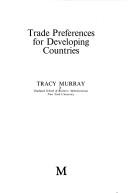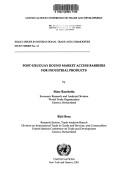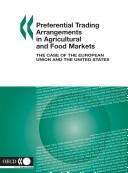Book
ISBN: 1462311385 1452787417 9786612842535 1451871783 1282842536 1451916140 Year: 2009 Publisher: Washington, D.C. : International Monetary Fund,
Abstract | Keywords | Export | Availability | Bookmark
 Loading...
Loading...Choose an application
- Reference Manager
- EndNote
- RefWorks (Direct export to RefWorks)
The literature measuring the impact of Preferential Trade Agreements (PTA) and WTO membership on trade flows has produced remarkably diverse results. Rose's (2004) seminal paper reports a range of specifications that show no WTO effects, but Subramanian and Wei (2007) contend that he does not fully control for multilateral resistance (which could bias WTO estimates). Subramanian and Wei (2007) address multilateral resistance comprehensively to report strong WTO trade effects for industrialized countries but do not account for unobserved bilateral heterogeneity (which could inflate WTO estimates). We unify these two approaches by accounting for both multilateral resistance and unobserved bilateral heterogeneity, while also allowing for individual trade effects of PTAs. WTO effects vanish and remain insignificant throughout once multilateral resistance, unobserved bilateral heterogeneity, and individual PTA effects are introduced. The result is robust to the use of alternative definitions and coding conventions for WTO membership that have been employed by Rose (2004), Tomz et al. (2007), or by Subramanian and Wei's (2007).
Commerce --- Business & Economics --- International Commerce --- Terms of trade. --- Tariff preferences. --- Differential duty --- Discriminating duty --- Generalized system of preferences (Tariff) --- GSP (Tariff) --- Preferences, Tariff --- Preferential duty --- Preferential tariff --- Trade preferences --- Tariff --- Competition, International --- Prices --- Exports and Imports --- Trade Policy --- International Trade Organizations --- Empirical Studies of Trade --- Trade: General --- International economics --- Trade agreements --- Trade balance --- Plurilateral trade --- Imports --- North American Free Trade Agreement --- Commercial treaties --- Balance of trade --- International trade --- Luxembourg
Book
ISBN: 1139063499 1107219809 1283112582 1139075829 9786613112583 1139082655 1139078089 1139080385 0511976445 113907007X 9781139078085 9780511976445 9781139080385 9781139080385 9781107000339 1107000335 1107459354 9781107459359 9781139063494 9781107219809 9781283112581 9781139075824 6613112585 9781139082655 Year: 2011 Publisher: Cambridge : Cambridge University Press,
Abstract | Keywords | Export | Availability | Bookmark
 Loading...
Loading...Choose an application
- Reference Manager
- EndNote
- RefWorks (Direct export to RefWorks)
This volume assembles a stellar group of scholars and experts to examine preferential trade agreements (PTAs), a topic that has time and again attracted the interest of analysts. It presents a discussion of the evolving economic analysis regarding PTAs and the various dysfunctions that continually place them among the priority items for (re)negotiation by the WTO. The book explores recent empirical research that casts doubt on the old 'trade diversion' school and debates why the WTO should deal with PTAs and if PTAs belong under the mandate of the WTO as we now know it.
Commercial treaties. --- Tariff preferences. --- Foreign trade regulation. --- Export and import controls --- Foreign trade control --- Foreign trade regulation --- Import and export controls --- International trade --- International trade control --- International trade regulation --- Prohibited exports and imports --- Trade regulation --- Differential duty --- Discriminating duty --- Generalized system of preferences (Tariff) --- GSP (Tariff) --- Preferences, Tariff --- Preferential duty --- Preferential tariff --- Trade preferences --- Tariff --- Trade agreements (Commerce) --- Competition, International --- Treaties --- Reciprocity (Commerce) --- Law and legislation --- Commercial treaties --- Tariff preferences --- E-books --- Law --- General and Others
Book
ISBN: 1462333605 145275716X 1283517647 9786613830098 1451913818 Year: 2008 Publisher: Washington, D.C. : International Monetary Fund,
Abstract | Keywords | Export | Availability | Bookmark
 Loading...
Loading...Choose an application
- Reference Manager
- EndNote
- RefWorks (Direct export to RefWorks)
Trade theories covering Preferential Trade Agreements (PTAs) are as diverse as the literature in search of their empirical support. To account for the model uncertainty that surrounds the validity of the competing PTA theories, we introduce Bayesian Model Averaging (BMA) to the PTA literature. BMA minimizes the sum of Type I and Type II error, the mean squared error, and generates predictive distributions with optimal predictive performance. Once model uncertainty is addressed as part of the empirical strategy, we report clear evidence of Trade Creation, Trade Diversion, and Open Bloc effects. After controlling for natural trading partner effects, Trade Creation is weaker - except for the EU. To calculate the actual effects of PTAs on trade flows we show that the analysis must be comprehensive: it must control for Trade Creation and Diversion as well as all possible PTAs. Several prominent control variables are also shown to be robustly related to Trade Creation; they relate to factor endowments and economic policy.
International trade --- Commercial treaties --- Tariff preferences --- Differential duty --- Discriminating duty --- Generalized system of preferences (Tariff) --- GSP (Tariff) --- Preferences, Tariff --- Preferential duty --- Preferential tariff --- Trade preferences --- Tariff --- Trade agreements (Commerce) --- Competition, International --- Foreign trade regulation --- Treaties --- Reciprocity (Commerce) --- Econometric models. --- Exports and Imports --- Econometrics --- Trade Policy --- International Trade Organizations --- Empirical Studies of Trade --- Bayesian Analysis: General --- International economics --- Bayesian inference --- Trade balance --- Trade agreements --- Plurilateral trade --- North American Free Trade Agreement --- Customs unions --- Bayesian models --- Econometric analysis --- Balance of trade --- Protectionism --- Econometric models --- Chile
Book
ISBN: 9789280811629 9280811622 9280871315 9789280871319 Year: 2009 Publisher: Tokyo: United Nations university press,
Abstract | Keywords | Export | Availability | Bookmark
 Loading...
Loading...Choose an application
- Reference Manager
- EndNote
- RefWorks (Direct export to RefWorks)
As multilateral negotiations become increasingly complex and protracted, preferential trade agreements have become the center of trade diplomacy, pushing beyond tariffs into deep integration and beyond regionalism into a web of bilateral deals, raising concerns about coercion by bigger players. This study examines American, European and Asian approaches to preferential trade agreements and their effects on trade, investment and economic welfare. It draws on theoretical works, but also examines the actual substance of agreements negotiated and envisaged.--Publisher's description.
Foreign trade policy --- America --- Asia --- Europe --- Tariff preferences --- Préférences douanières --- Etats-Unis --- BUSINESS & ECONOMICS --- Commercial Policy --- Commerce --- Business & Economics --- International Commerce --- Préférences douanières --- Differential duty --- Discriminating duty --- Generalized system of preferences (Tariff) --- GSP (Tariff) --- Preferences, Tariff --- Preferential duty --- Preferential tariff --- Trade preferences --- Tariff --- E-books --- Tariff preferences - United States --- Tariff preferences - Europe --- Tariff preferences - Asia --- Droit international économique --- Droit commercial (droit international) --- Commerce international --- Accords commerciaux --- Coopération internationale --- États-Unis --- Asie --- Etudes comparatives --- Droit international économique --- Coopération internationale --- États-Unis

ISBN: 0333189701 0333189698 9780333189702 Year: 1977 Publisher: London: MacMillan,
Abstract | Keywords | Export | Availability | Bookmark
 Loading...
Loading...Choose an application
- Reference Manager
- EndNote
- RefWorks (Direct export to RefWorks)
Foreign trade policy --- Developing countries --- Tariff --- Tariff preferences --- 339.54 --- 339.96 --- 800 Collectie Vlaams Vredesinstituut --- 813 Methodologie --- 822.1 Verenigde Naties --- 822.5 Europese Unie --- 825 Ontwikkelingssamenwerking --- 831 Internationale Politieke Economie --- 831.1 Handelspolitiek --- 882.4 Noord-Amerika --- 883.2 Oost-Azië --- Buitenlandse economische politiek. Buitenlandse handelspolitiek. Instrumentarium van de buitenlandse handel --- Ontwikkelingshulp. Ontwikkelingssamenwerking. Ontwikkelingsproblematiek --- 339.96 Ontwikkelingshulp. Ontwikkelingssamenwerking. Ontwikkelingsproblematiek --- 339.54 Buitenlandse economische politiek. Buitenlandse handelspolitiek. Instrumentarium van de buitenlandse handel --- Differential duty --- Discriminating duty --- Generalized system of preferences (Tariff) --- GSP (Tariff) --- Preferences, Tariff --- Preferential duty --- Preferential tariff --- Trade preferences

ISBN: 9211125340 9789211125344 Year: 2001 Volume: 12 Publisher: New York: United Nations,
Abstract | Keywords | Export | Availability | Bookmark
 Loading...
Loading...Choose an application
- Reference Manager
- EndNote
- RefWorks (Direct export to RefWorks)
Protectionism --- Favored nation clause --- Tariff preferences --- Non-tariff trade barriers --- 339 --- Non-tariff distortions of trade --- Nontariff trade barriers --- Tariff --- Differential duty --- Discriminating duty --- Generalized system of preferences (Tariff) --- GSP (Tariff) --- Preferences, Tariff --- Preferential duty --- Preferential tariff --- Trade preferences --- Free trade and protection --- Commercial policy --- Most favored nation clause --- Clauses (Law) --- Commercial treaties --- Reciprocity (Commerce) --- Handel. Internationale economische betrekkingen. Wereldeconomie --binnenlandse als buitenlandse handel; zie ook {339.3} en {339.5} --- Tariff preferences. --- 339 Handel. Internationale economische betrekkingen. Wereldeconomie --binnenlandse als buitenlandse handel; zie ook {339.3} en {339.5}
Book
ISBN: 9780801446436 0801446430 1322503281 0801458706 9780801458705 0801457467 0801479258 9780801479250 9780801457463 Year: 2009 Publisher: Ithaca : Cornell University Press,
Abstract | Keywords | Export | Availability | Bookmark
 Loading...
Loading...Choose an application
- Reference Manager
- EndNote
- RefWorks (Direct export to RefWorks)
Preferential trade agreements have become common ways to protect or restrict access to national markets in products and services. The United States has signed trade agreements with almost two dozen countries as close as Mexico and Canada and as distant as Morocco and Australia. The European Union has done the same. In addition to addressing economic issues, these agreements also regulate the protection of human rights. In Forced to Be Good, Emilie M. Hafner-Burton tells the story of the politics of such agreements and of the ways in which governments pursue market integration policies that advance their own political interests, including human rights. How and why do global norms for social justice become international regulations linked to seemingly unrelated issues, such as trade? Hafner-Burton finds that the process has been unconventional. Efforts by human rights advocates and labor unions to spread human rights ideals, for example, do not explain why American and European governments employ preferential trade agreements to protect human rights. Instead, most of the regulations protecting human rights are codified in global moral principles and laws only because they serve policymakers' interests in accumulating power or resources or solving other problems. Otherwise, demands by moral advocates are tossed aside. And, as Hafner-Burton shows, even the inclusion of human rights protections in trade agreements is no guarantee of real change, because many of the governments that sign on to fair trade regulations oppose such protections and do not intend to force their implementation. Ultimately, Hafner-Burton finds that, despite the difficulty of enforcing good regulations and the less-than-noble motives for including them, trade agreements that include human rights provisions have made a positive difference in the lives of some of the people they are intended-on paper, at least-to protect.
Tariff preferences --- Commercial treaties --- International trade --- Human rights --- Préférences douanières --- Accords commerciaux --- Commerce international --- Droits de l'homme (Droit international) --- Social aspects. --- Economic aspects. --- Aspect social --- Aspect économique --- POLITICAL SCIENCE --- International Relations / Trade & Tariffs --- Commerce --- Business & Economics --- International Commerce --- Social aspects --- Economic aspects --- Préférences douanières --- Aspect économique --- Basic rights --- Civil rights (International law) --- Rights, Human --- Rights of man --- Trade agreements (Commerce) --- Differential duty --- Discriminating duty --- Generalized system of preferences (Tariff) --- GSP (Tariff) --- Preferences, Tariff --- Preferential duty --- Preferential tariff --- Trade preferences --- Law and legislation --- Human security --- Transitional justice --- Truth commissions --- Competition, International --- Foreign trade regulation --- Treaties --- Reciprocity (Commerce) --- Tariff

ISBN: 1280356480 9786610356485 9264009337 9264009329 Year: 2005 Publisher: Paris : Organisation for Economic Co-operation and Development,
Abstract | Keywords | Export | Availability | Bookmark
 Loading...
Loading...Choose an application
- Reference Manager
- EndNote
- RefWorks (Direct export to RefWorks)
Developing countries are concerned that multilateral tariff reductions will harm their agricultural sectors because of preference erosion. The findings in this report suggest that although this may indeed be a problem for some countries in some sectors, factors other than preferential schemes may be limiting developing country exports. The report provides information on the extent to which developing countries have used selected, non-reciprocal preferential trading schemes provided by the EU and the US. Secondary data are complemented by interviews with market operators further clarifying the empirical findings. A special section has been devoted to the preferences granted to African countries highlighting the conditions for this set of developing countries.--Publisher's description.
Farm produce -- Marketing. --- Food industry and trade. --- Tariff preferences -- Economic aspects. --- Tariff preferences -- European Union. --- Tariff preferences -- United States. --- Tariff preferences --- Farm produce --- Food industry and trade --- Commerce --- Business & Economics --- International Commerce --- Economic aspects --- Marketing --- Economic aspects. --- Marketing. --- Food preparation industry --- Food processing industry --- Food trade --- Agricultural marketing --- Marketing of farm produce --- Differential duty --- Discriminating duty --- Generalized system of preferences (Tariff) --- GSP (Tariff) --- Preferences, Tariff --- Preferential duty --- Preferential tariff --- Trade preferences --- Agricultural processing industries --- Processed foods --- Agriculture --- Tariff --- Food --- Food processing --- Food technology --- Processing --- European Union --- United States
Book
ISBN: 3878952821 Year: 1985 Publisher: Hamburg Weltarchiv
Abstract | Keywords | Export | Availability | Bookmark
 Loading...
Loading...Choose an application
- Reference Manager
- EndNote
- RefWorks (Direct export to RefWorks)
Tariff preferences --- -Developing Countries --- AA / International- internationaal --- 334.153.1 --- Differential duty --- Discriminating duty --- Generalized system of preferences (Tariff) --- GSP (Tariff) --- Preferences, Tariff --- Preferential duty --- Preferential tariff --- Trade preferences --- Tariff --- Commerce --- -Handel, douanetarief en handelsakkoorden in de Europese Gemeenschappen. --- European Economic Community countries --- -Common market countries --- European common market countries --- Europe --- -Tariff preferences --- Developing Countries --- -Commerce --- Handel, douanetarief en handelsakkoorden in de Europese Gemeenschappen --- Developing countries --- Common market countries --- Emerging nations --- Fourth World --- Global South --- LDC's --- Least developed countries --- Less developed countries --- Newly industrialized countries --- Newly industrializing countries --- NICs (Newly industrialized countries) --- Third World --- Underdeveloped areas --- Underdeveloped countries
Book
ISBN: 9781107000339 9780511976445 9781107459359 Year: 2011 Publisher: Cambridge Cambridge University Press
Abstract | Keywords | Export | Availability | Bookmark
 Loading...
Loading...Choose an application
- Reference Manager
- EndNote
- RefWorks (Direct export to RefWorks)
Commercial treaties --- Tariff preferences --- Foreign trade regulation --- handelspolitiek, internationaal --- 339.54 --- Export and import controls --- Foreign trade control --- Import and export controls --- International trade --- International trade control --- International trade regulation --- Prohibited exports and imports --- Trade regulation --- Differential duty --- Discriminating duty --- Generalized system of preferences (Tariff) --- GSP (Tariff) --- Preferences, Tariff --- Preferential duty --- Preferential tariff --- Trade preferences --- Tariff --- Trade agreements (Commerce) --- Competition, International --- Treaties --- Reciprocity (Commerce) --- Buitenlandse economische politiek. Buitenlandse handelspolitiek. Instrumentarium van de buitenlandse handel --- Law and legislation --- Commercial treaties. --- Foreign trade regulation. --- Tariff preferences. --- 339.54 Buitenlandse economische politiek. Buitenlandse handelspolitiek. Instrumentarium van de buitenlandse handel

 Search
Search Feedback
Feedback About UniCat
About UniCat  Help
Help News
News